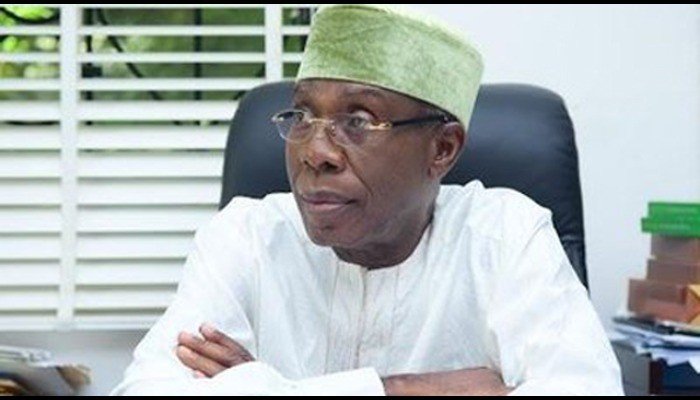On August 9, 2025, Nigeria lost one of its most thoughtful and principled public servants. Audu Ogbeh, who served as Nigeria’s Minister of Agriculture and Rural Development from 2015 to 2019, passed away at the age of 78.
While his long career in politics, academia, and culture earned him national respect, his stewardship of Nigeria’s agricultural sector during a critical economic shift will probably, remain his most enduring legacy.
Audu Ogbeh will be remembered as the minister who tried to redefine agriculture as a serious driver of economic growth in a post-oil Nigeria.
Appointed by President Muhammadu Buhari in 2015, Ogbeh stepped into office at a time when the country was grappling with an oil-price crash and desperately searching for alternative revenue sources. His response was clear and consistent: “Agriculture is our next oil.”
Read also: Audu Ogbeh death a monumental loss Akume
More than rhetoric, Ogbeh brought structure and vision to that ambition through what became known as the Green Alternative — Nigeria’s official Agricultural Promotion Policy (APP) launched in 2016.
The policy aimed to improve food security, stimulate job creation, reduce food imports, and encourage agribusiness investment. Under his watch, agriculture re-entered the national conversation not as subsistence survival, but as a platform for innovation, youth engagement, and national pride.
One of Ogbeh’s most impactful areas was in rice production. He championed local rice farming and discouraged the country’s dependence on imports.
“Why should we be importing what we can grow?” he often asked. His push — alongside initiatives like the Central Bank’s Anchor Borrowers’ Programme — led to a sharp rise in domestic rice production and the revitalization of several dormant rice mills across the country.
He also oversaw reforms in the fertilizer supply chain, championing the roll out of the Presidential Fertilizer Initiative (PFI) – successfully being implemented by the Nigeria Sovereign Investment Authority (NSIA) – and aimed to eliminate corruption and middlemen in fertilizer distribution.
The PFI drastically improved access and affordability for smallholder farmers, especially in northern Nigeria, and was widely seen as a win for transparency and efficiency.
Throughout his tenure, Ogbeh advocated for greater mechanization, irrigation infrastructure, rural access roads, and better financing models to modernize the sector. Though these areas remained challenging, his insistence on systemic reform laid groundwork for the next phase of agricultural transformation.
But his impact went beyond policy. He was a persuasive communicator, often using history, metaphor, and grounded wisdom to explain complex agricultural and economic issues. Whether in interviews or Senate appearances, he spoke plainly, passionately, and always from a place of conviction. He brought dignity to farming and sought to change how Nigerians — especially young people — viewed agriculture: not as dirty, backbreaking work, but as a future worth investing in.
He also understood agriculture as a tool for national security — arguing that food security was directly linked to peace and youth empowerment. His belief in agriculture’s role in stabilizing communities informed his work in policy and advocacy long after leaving office.
Read also: Audu Ogbeh: The man who ploughed both soil and power
During his tenure, Ogbeh proposed the National Ranching Policy to address the recurring conflicts between crop farmers and migrating cattle herders, insisting that ranching was the most sustainable long-term solution. However, the proposal met resistance, as many states refused to allocate land without formal lease or purchase agreements.
Ogbeh also oversaw the second phase of the Agricultural Equipment Hiring Enterprise (AEHE) under the Mechanization Intervention Programme (MIP), aimed at improving access to modern equipment. He promoted inclusivity through the National Gender Action Plan (NGAP), which empowered women with the skills and tools to engage in large-scale farming.
From 2015 to 2018, the ministry reported a 60% reduction in food imports, saving over $800 million on rice, wheat, sugar, tomatoes, and milk. However, criticism arose after a U.S. report claimed Nigeria imported over three million metric tonnes of rice in 2018—a claim denied by the federal government and the CBN.
Despite the achievements, critics pointed to the challenges that remained — such as food price volatility, low mechanization levels, and rural poverty — but even many of them acknowledged that Ogbeh brought a seriousness and strategic vision to the agric ministry. He may not have solved all the problems, but he helped Nigeria ask the right questions — and take the first steps toward answering them.
Born in 1947 in Otukpo, Benue State, Ogbeh’s journey from academic to politician, playwright to farmer, and eventually to cabinet minister, was marked by integrity. Before serving in Buhari’s cabinet, he had been minister of communications and minister of steel in the seond republic and later National Chairman of the Peoples Democratic Party (PDP). Yet he remained most proud of being a farmer — and insisted on being referred to as such long after he left office.
President Tinubu has described him as “a patriot whose wisdom, dedication, and pursuit of progress left an indelible mark on Nigeria’s political landscape,” noting that “he was always ready with facts and figures to support his propositions.”
According to him, Nigeria will miss his insightful perspectives and wealth of experience
George Akume, Secretary to the Government of the Federation (SGF), called him “a distinguished leader, teacher, patriot, consummate public servant, and quintessential intellectual, who shone more than a million stars in the service of his community, Benue State, and Nigeria as a whole.” He described his death as a monumental loss to the nation.
Read also: Audu Ogbe dies at 78
As tributes continue to pour in from across political and regional divides, one thing stands out: Audu Ogbeh will be remembered not just as a former agriculture minister, but as a voice of reason, a driver of the Green Alternative policy, and a tireless advocate for Nigeria’s rural heartland.
In a country still striving for sustainable growth and national cohesion, Ogbeh’s legacy offers a clear lesson: a strong nation must first be able to feed itself.


